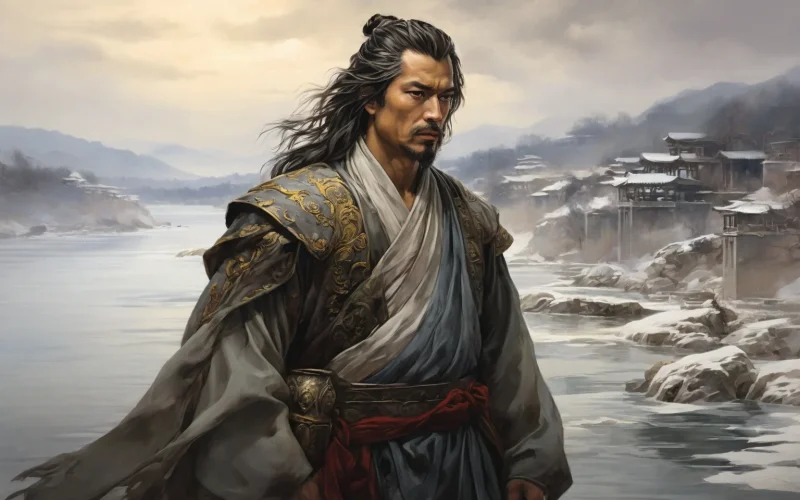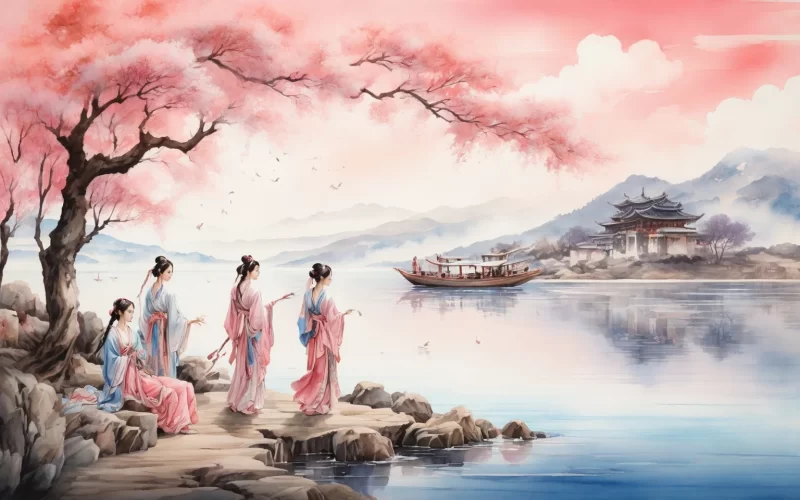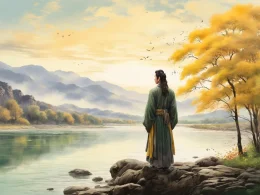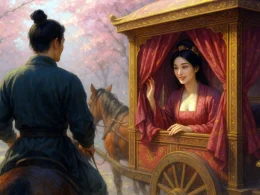The hero left his friend
With angry hair on end.
The martyr's now no more,
The waves cold as of yore.
Original Poem
「于易水送人一绝」
骆宾王
此地别燕丹,壮士发冲冠。
昔时人已没,今日水犹寒。
Interpretation
This quintessential five-character quatrain by early Tang poet Luo Binwang intertwines historical memory with contemporary sentiment. By evoking the legendary farewell of Jing Ke at the Yi River, the poet channels both personal frustration over unrecognized talent and an impassioned tribute to a departing friend. In sparse yet profound language, the poem merges historical gravitas with present-day resolve, expressing the anguish of unfulfilled loyalty to one's nation.
First Couplet: "此地别燕丹,壮士发冲冠。"
Cǐ dì bié Yān Dān, zhuàngshì fà chōng guān.
Here once parted Jing Ke, crown prince of Yan; The warrior's wrath made his hair upstand.
The poem opens with geographical immediacy—"here" (此地) collapses time, linking the present farewell to Jing Ke's legendary departure. "Hair upstand" (发冲冠), a classical trope for righteous fury, immortalizes the assassin's defiance. The couplet's power lies in its kinetic energy: history's most iconic protest against tyranny becomes a living touchstone for the poet's own era.
Second Couplet: "昔时人已没,今日水犹寒。"
Xīshí rén yǐ mò, jīnrì shuǐ yóu hán.
That man of old is dust, yet still— The Yi River runs ice-chilled.
Time's paradox unfolds: though the hero perished, the river retains his glacial resolve. "Ice-chilled" (水犹寒) operates on three levels—literal temperature, historical resonance, and the poet's own frozen opportunities. The enduring cold becomes both memorial and indictment: the world remains as inhospitable to principle now as then.
Holistic Appreciation
This poem employs the heroic legend of Jing Ke's farewell at the Yi River to elevate a contemporary parting scene to historical grandeur. The poet, facing a real-life farewell, transcends sentimental attachment and instead channels heroic passion and historical sorrow. The lines "The heroes of old are gone, yet today the river remains cold" poignantly convey how historical valor endures while reality remains harsh and indifferent. Compact yet profound, the poem blends solemnity with fervor, revealing a visionary's deep understanding of the conflict between ideals and reality—a reading experience that stirs profound reflection.
Artistic Merits
With ingenious conception, this twenty-character poem seamlessly merges scene and emotion, naturally incorporates historical allusion, and delivers far-reaching significance. The poet threads the word "cold" throughout, using the Yi River's imagery to mirror inner sentiment, fusing ancient and modern pathos into one. Its language is distilled, its emotion weighty. The first line invokes the past; the second narrates the present—this contrast heightens its impact. Most remarkably, it breaks from conventional farewell poetry by omitting sentimental parting and instead refracting the struggle of unrealized ideals through historical lens, achieving both lofty perspective and profound insight.
Insights
This poem urges us to honor historical heroes while reflecting on the present: how to sustain their spirit of righteous sacrifice, how to uphold conviction in an unyielding reality. The poet's "cold" stems not just from the river's chill but also from the pain of buried aspirations. It inspires us to cherish those with noble ambitions and to strive tirelessly for ideals, never compromising belief in the face of adversity.
Poem translator
Kiang Kanghu
About the poet:
Luo Binwang (骆宾王), circa 640 - 684 A.D., was a native of Yiwu, Zhejiang Province, who was able to write poetry at the age of seven. He was one of the “Four Heroes of the Early Tang Dynasty”, together with Wang Bo and other poets and writers. He was one of the “Four Heroes of the Early Tang Dynasty”. His poems were characterized by seven lines of poetry, with many words of grief and anger.












